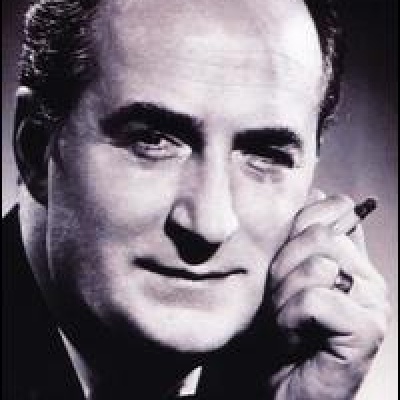
George Melachrino
by Stephen Thomas ErlewineBritish composer/arranger George Melachrino is famous for his Moods in Music series, which attempted to provide a soundtrack for everyday events like dining, working, and romance. Melachrino's records were distinctive for his lush, rich strings with gave his music a luxurious, romantic quality. In addition to his Moods in Music albums, he had a string of hit singles and recording albums consisting of movie themes, popular songs, and show tunes. Melachrino began playing music as a child. His Greek parents gave him a violin at the age of five and he immediately wrote his first composition. When he was 14 years old, he enrolled at the Trinity College of Music, where he studied strings and chamber music. Two years later, while he was still a student, he wrote a piece for a string sextette which was performed throughout London. Before he completed school, he decided to learn every orchestral instrument; by the time he graduated, he had fulfilled his goal, learning every instrument besides piano and harp. Melachrino began a performing career in 1927 with a British Broadcasting Company session. As he continued to play, he began to expand his tastes from classical music, experimenting with jazz and pop music. He joined dance bands, including groups led by Ambrose, Harry Hudson, Carroll Gibbons, and Bert Firman. Melachrino formed a dance band in 1939, which played at the respected London theatre the Cafe de Paris; it disbanded in 1940. When World War II began, Melachrino joined the British service as a military policeman. He would later earn the ranking of a Regimental Sergeant-Major, after which he joined the Stars of Battledress troupe. During the War, he was also the leader of the British Band of the Allied Expeditionary Forces, as well as the leader of the British Orchestra in Khaki, which consisted entirely of serving soldiers, and the musical director of the Army Radio Unit. Melachrino also sang with the American and Canadian Allied Expeditionary Forces bands. With each of his wartime bands, he was working with bands that had large string sections, which would prove to be crucial to the music he made after the war. Once the war was over, Melachrino led to separate outfits -- the George Melachrino Orchestra and the Melachrino Strings -- which were quite similar in sound. Both units featured sentimental, string-laden arrangements, with light brass and woodwind touches. In addition to leading these bands, he founded the Melachrino Music Organization, which provdied music for films, radio, and records. In the late '40s, he wrote scores for films, including Woman to Woman, No Orchids for Miss Blandish, Code of Scotland Yard, Story of Shirley Yorke, and Dark Secret; he also wrote the music for the musical Starlight Roof. Melachrino began recording for RCA, making over 100 78s and over 50 LPs. Out of all of his albums -- which were frequently hits -- the most notable were his Music for Moods series, which included such records as Music for Dining, Music to Help You Sleep, Music for Two People Alone, Music for Faith and Inner Calm, Music for Daydreaming, and Music for Relaxation, among many others. All of the Music for Moods albums were produced by Ethel Gabriel, who helped mastermind their sound and direction. Melachrino's career was going strong into the '60s, as he began recording for ABC Paramount. In 1965, he suffered a fatal accident at his home. He was still successful at the time of his death, and the Melachrino Strings and Orchestra continued without him under the direction of Robert Mandell.
